We’ve learned a lot from the National Basketball Association’s kowtow to the People’s Republic of China.
Here are five takeaways.
First, capitalism is loyal to no country.
Mitch Albom, a columnist for the Detroit Free Press, aptly headlined his October 13 piece, “Price for the NBA in China? Its soul.” Albom added, “China continues to seduce American businesses. But we’re starting to see the real price of all those billions.”
Then there’s the NBA’s leading player, LeBron James, who should forever be remembered as the man kneeling in that photo that ran atop the Drudge Report on October 15; the caption: “LeBron Bows to Communists.” James has proven himself to be as supine and spineless as NBA Commissioner Adam Silver.

The photo used alongside Drudge Report’s “LeBron Bows to Communists” post on October 15. (Marcio Jose Sanchez/AP Photo)
And while James is known mostly as an athlete, he is, in fact, a full-blown capitalist combine, reaping hundreds of millions in endorsements and movie deals. In the harsh words of Washington Post film critic Sonny Bunch, “If LeBron James is an amoral monster, he’s no more a monster than most others in the film industry.”
Speaking of the film industry, Breitbart News’s John Nolte has pointed out that Hollywood’s record of surrendering to China is, if anything, worse than the NBA’s.
Of course, the issue is broader than the NBA, and broader than Hollywood; just about every big American corporation has come to rely on China to produce goods in that land of low wages, lousy working conditions, and mucho pollution. How can, or should, American workers compete with that? As Erick Erickson put it, “American companies are signaling they like communist money more than American freedom.”
Is the Fortune 500 patriotic? Fuhgeddaboutit.

The opening ceremony of the Shanghai Stock Exchange’s Sci-Tech Innovation Board in Shanghai on July 22, 2019. (STR/AFP/Getty Images)
Second, woke is smoke.
That is, wokeness is just a smokescreen. A smokescreen for allowing certain groups to wrap themselves in the latest cloak of politically correct piety while seeking to crush less favored groups. Wokeness has nothing to do with justice or equality, and everything to do with envy and enrichment. That is, if one group attacks another group and wins, it can capture both its status and wealth.
You see, wokesters are all about power, including the power to say that something is good, or something is bad—and then the further power to change on a whim, just to prove how powerful they are.
So that’s wokeness in action: It’s a power-move, nothing more. So every time that the NBA was delivering lectures on “social justice”—and who doubts that it will deliver still more lectures—we can listen and think to ourselves: If these people gave a fig about human rights or social justice, they wouldn’t be in bed with the totalitarian Red Chinese.
Of course, being outed as well-compensated stooges won’t stop corporate “leaders” from continuing to pontificate about the U.S. Why, it’s even likely that the likes of LeBron James, Golden State Warriors coach Steve Kerr, and all the other rich hypocrites will double down. As noted, wokeness is about power, and the wokesters will use that power to change the subject, from their bowing down to China to their lecturing us, yet again, about our many supposed sins.
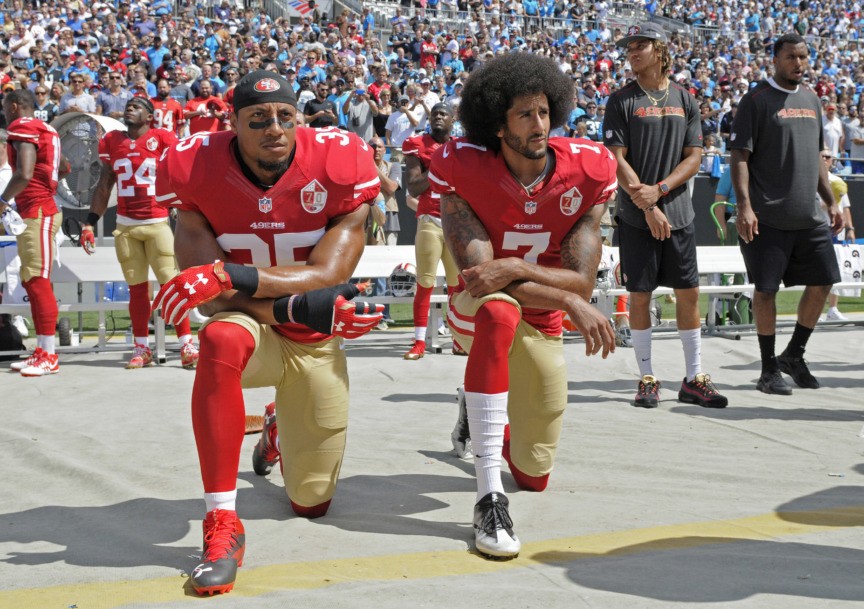
San Francisco 49ers’ Colin Kaepernick (7) and Eric Reid (35) kneel in protest of police brutality during the national anthem before an NFL football game on September 18, 2016. (AP Photo/Mike McCarn)

A pro-democracy protester is arrested by riot police in a cloud of tear gas during a demonstration on October 20, 2019 in Hong Kong, China.(Anthony Kwan/Getty Images)
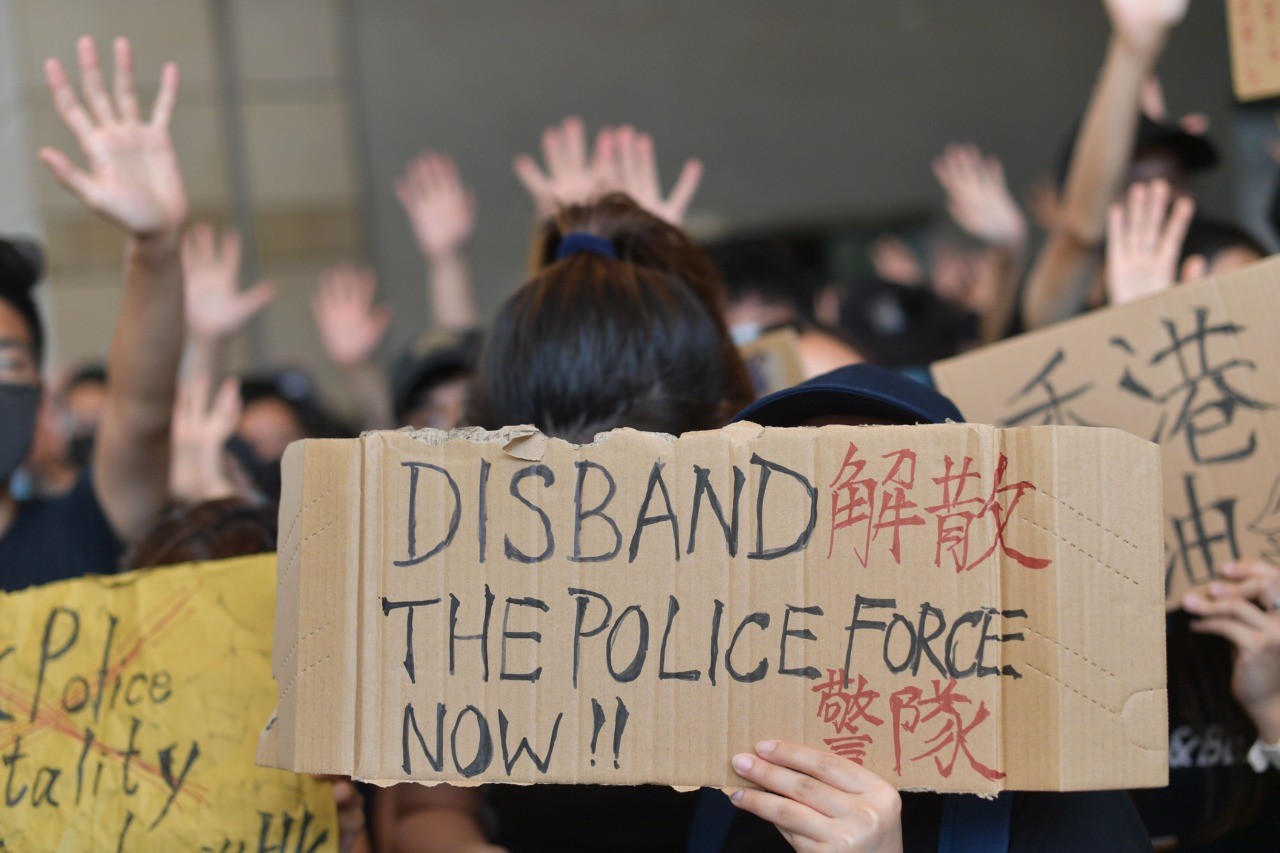
Protesters and supporters gather outside the entrance to the West Kowloon Court in Hong Kong on October 2, 2019, where some 96 arrested protesters were to make an appearance in court. (Nicolas ASFOURI/AFP/Getty Images)
Third, globalism and wokesterism are just code words for paying most workers lower wages—and a lucky few workers higher wages.
For at least three decades now—since the end of the Cold War, which opened up the world to investment, free from concern about communist insurgents—corporations have figured out new ways to profit from borderlessness. And so a favored few—such as athletes, movies stars, and Wall Streeters—have flourished, even as most workers have languished.
Interestingly, way back in 1992, the cyber-sci-fi novelist Neal Stephenson prophesied what was coming in his novel, Snow Crash. As he wrote, globalism would lead to a new kind of skew across the planet:
Once we’ve brain-drained all our technology into other countries, once things have evened out, they’re making cars in Bolivia and microwave ovens in Tadzhikistan and selling them here—once our edge in natural resources has been made irrelevant by giant Hong Kong ships and dirigibles that can ship North Dakota all the way to New Zealand for a nickel—once the invisible hand has taken all those historical inequities and smeared them out into a broad global layer of what a Pakistani brickmaker would consider to be prosperity.
Stephenson’s literary flourishes aside, that’s pretty much what has happened: Offshoring and outsourcing have been disastrous for the American labor force; it’s a main reason why workers’ wages have flatlined in the U.S., even as global trade has zoomed. As former Breitbart News chief Stephen K. Bannon said three years ago, “The globalists gutted the American working class and created a middle class in Asia.”
We can add that the free market is a tool to achieve international economic equilibrium, which is not the same thing as a tool to achieve high wages in one country, such as the United States. In a global context, if companies know they have the alternative of a qualified work force in a cheaper country—and China has a billion qualified workers—that puts downward pressure on the pay rates of American workers. (Of course, the same downward-pressuring dynamic applies to the influx of low-wage workers coming into the U.S.; the Chamber of Commerce has thought of all the angles.)
So if we step back and think about the last three decades, we can realize that every time an American businessperson said, “We’re going to look to another country, and to its workforce, to produce goods more cheaply,” that was an erosion of the wellbeing of the American middle class—and some might even say, a stab in the back.
Of course, companies couldn’t just come out and say they wanted to make bigger profits while laying off Americans, as well as using the threat of layoffs to hold wages down for the rest of the workforce.
Thus, as a diversion, corporations developed a whole new jargon of change-the-subject liberalism. During Bill Clinton’s presidency, corporate types were pitching John Lennon-type, one-world utopianism, as heard in his famous song, “Imagine.” Unfortunately for that pie-in-the-sky vision, after 9/11, it became obvious that the world was not converging into peacenik oneness.
Yet corporations didn’t want to stop outsourcing, and so they developed a newer, hipper, and trendier rationale for outsourcing: Okay, we’re cutting wages, but hey look! We just bought a table at the gay rights dinner.
And when that kind of liberalism got old, corporate American tripped into outright wokesterism, as embodied by woke martyr/millionaire Colin Kaepernick, or by Gillette’s bizarro “toxic masculinity” campaign.
For his part, Virgil has been chronicling woke capital since 2016; he sees that corporations are waging a class war against the middle class, cleverly disguised as a woke war against the patriarchy, prisons, single-sex bathrooms, the carbon dioxide molecule—or anything else that comes to mind.
This whole apparatus of corporate wokeness is, in fact, so ridiculous that even some in the MSM are willing to acknowledge that CEOs are living by a “double standard”—one standard for them, one standard for us. Yet there is one thing that company chiefs haven’t had to worry about: No matter how much they move to the left, they can count on Republican officeholders to keep their taxes low; in other words, corporate types can get the fun of being liberals, without having to pay for it.
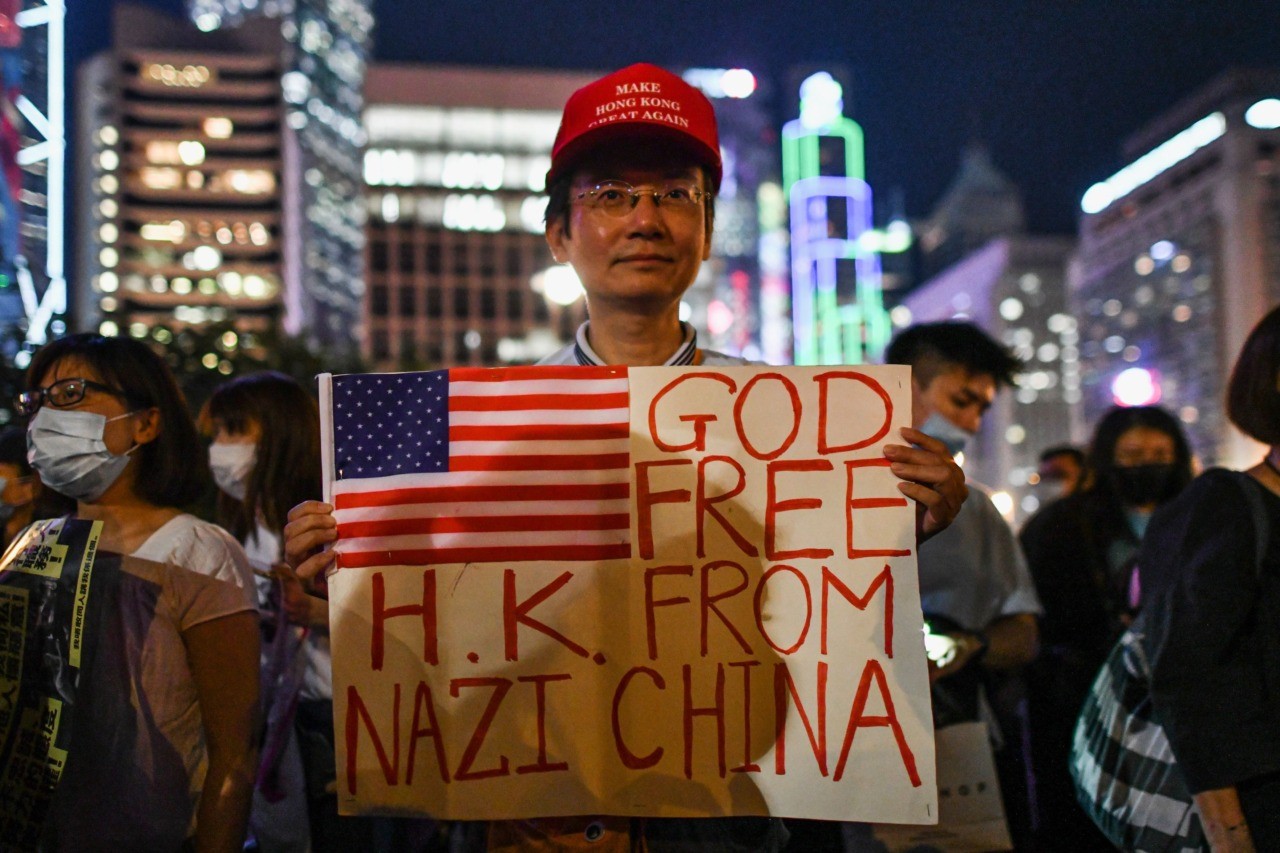
A pro-democracy protester at a rally at Edinburgh Place in Hong Kong on September 27, 2019. (MOHD RASFAN/AFP/Getty Images)
Fourth, Democrats hate Trump so much that they don’t care about China.
To prove this point, we might consider the ongoing trade war with the People’s Republic. Ask yourself: Do the Democrats want Trump to succeed? Or do they want him to fail? And if Trump fails, and the economy slides into recession, do you think that will make Democrats sad—or happy?
Indeed, beyond the NBA’s and capitalism’s kowtow, there are lots of issues to think about in regard to China, including intellectual property theft, military competition, and, of course, the human rights of Hong Kongers, Christians, Muslims, Tibetans, and Falun Gong practitioners. Here and there, some Democrats speak up about those issues, and yet as we all know, they subordinate their overseas concerns to their real goal on the homefront: getting rid of Trump. Indeed, the only real question the Democrats have is whether to try and impeach him out now, or wait a bit and try to vote him out next year.
In the meantime, Democrats, as the self-proclaimed party of the rich—the party of the blue dots and of the prosperous portions of the Atlantic and Pacific coasts, which have most profited from globalism—know that if they are ever to gain a national majority, they have to win more in the red interior of the country.
So the Democrats have come up with a plan: They will use internationalist money to buy congressional seats in nationalist territory. A case in point is Kentucky; an October 16 headline in the Washington Free Beacon told the tale of a planned leveraged buyout of a red state: “McConnell Challenger Stockpiles Cash From Steve Kerr, Hollywood: More than 96 percent of Amy McGrath’s contributions came from outside Kentucky.”
Yes, Sen. Mitch McConnell’s wannabe challenger, Amy McGrath, never elected to anything before, has already raised a whopping $3.6 million, even as just $140,000 of that came from Kentucky—a state she failed to mention in her announcement video. Of course, given that McGrath received $2 million from the coastal blue zones of California, Massachusetts, and New York, it’s easy to see why she would forget the Bluegrass State. As a McConnell campaign spokesman said puckishly, “Hollywood liberals are pumping cash into McGrath’s campaign because they think she’ll provide California a third vote in the Senate.”
So we can see: The Democrats, engorged with globalist money, are going to do their best—and spend their most—to acquire Republican seats, thereby adding to their blue empire. If McGrath were to beat McConnell, it’s a safe bet that she would have nothing to say about her coastal paymasters’ kowtow to China.
Fifth, and perhaps most importantly, we’ve seen this sort of foreign penetration before—and we’ve overcome it.
In the 18th century, during the American Revolution, not every American was a patriot. Indeed, perhaps a third of the population were “Tories,” loyal to Britain’s King George III. One such, in fact, was Ben Franklin’s own son, William Franklin, who chose exile over independence and died in London. So how did the good guys win? Answer: They tried harder.
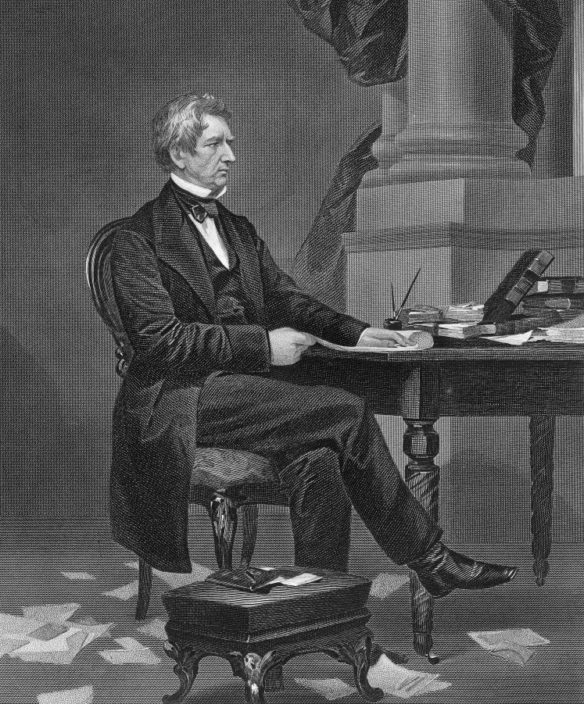
William Henry Seward, circa 1870. As U.S. secretary of state during the Civil War, he prevented European official recognition of the Confederacy. (Hulton Archive/Getty Images)
Then, in the 19th century, during the Civil War, the U.S. was again vulnerable to foreign encroachment. The Confederacy was vocal in its desire to have the great powers of the day, Britain and France, intervene on its behalf. If such an intervention had happened, the South might have prevailed against the North, but then it would inevitably have been re-colonized by the Europeans. Sad!
Fortunately, two under-appreciated heroes of the Union cause—Secretary of State William Seward and the U.S. Navy—blocked any of that from happening. For his part, Seward used diplomacy, pointing out to the Europeans that they didn’t want to be stained by slavery. And for its part, the Navy used its blockading seapower; European ships wouldn’t get through to Dixie without a fight.
Next, in the 20th century, the U.S. faced two huge foreign threats, fascism and communism, both of which insinuated slimy tentacles into the U.S. In the 1930s, both the Nazi Germans and the Soviet Russians had their supporters in America; Hitler’s fans were organized into the German-American Bund, and Stalin’s fans were members of the Communist Party USA. In fact, both enemy infiltrations, each in its own way, formed what was known as a fifth column–that is, a group of agents ready to be activated for subversion, even insurrection.
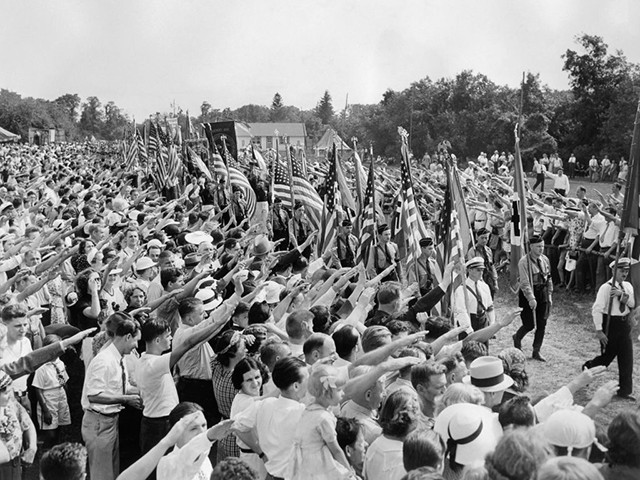
Hundreds of thousands of German-Americans sympathizing with Nazi Germany raise their hands in a Nazi salute to the passage of the German-American Bund during an annual “German Day” celebration at Camp Siegfried in Yaphank on August 29, 1937, in Long Island. (AFP/Getty Images)
In response, Uncle Sam got tough. The Foreign Agents Registration Act, aimed at cutting off the foreign funding of risky groups, was passed in 1938. Two years later, the Alien Registration Act, better known as the Smith Act, came into being, further empowering federal law enforcers.
Happily, the Bund was squelched in 1939, and the communists were closely watched by J. Edgar Hoover’s FBI, even as we cooperated with the Soviet Union during World War Two to defeat the greater enemy, Nazi Germany.
Only after the Good War ended in 1945 did we turn our full attention to the Cold War, which, of righteous necessity, included stomping on the internal threat from communism.
In 1947, President Harry Truman imposed much-needed loyalty oaths on federal employees and contractors. Then, in 1948, Congressman Richard Nixon and the House Un-American Activities Committee helped expose and imprison Alger Hiss and other communist spies. And in 1952, the Immigration and Nationality Act, popularly known as the McCarran-Walter Act, toughened up on suspect immigration.
Without a doubt, the Cold War was an ordeal, as hot wars, such as Korea and Vietnam, punctuated what John F. Kennedy called the “long twilight struggle.”
Yet in the end, the U.S. prevailed. How, exactly, we prevailed is a much longer story, although here at Breitbart News, Virgil has bitten off pieces of the tale, here, here, and here.
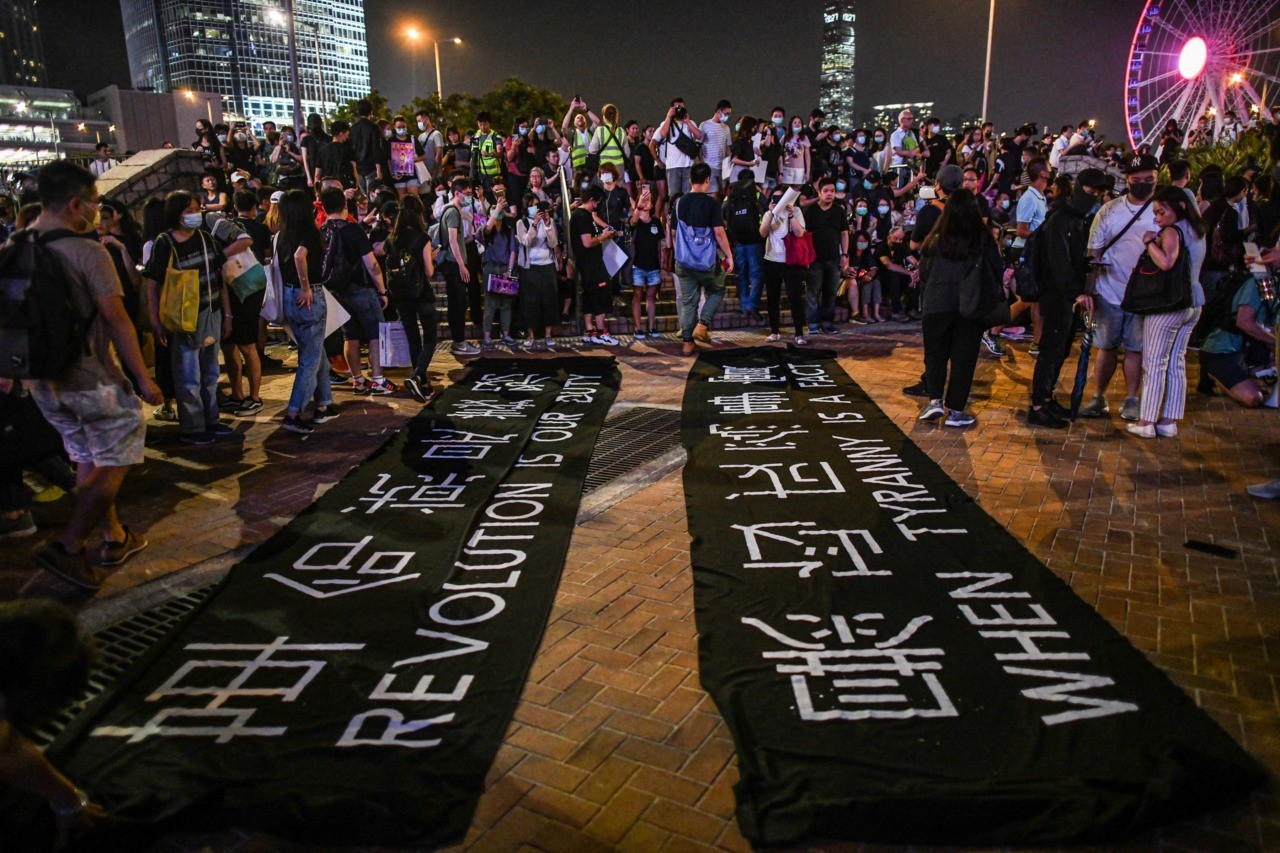
Pro-democracy protesters attend a rally at Edinburgh Place in Hong Kong on September 27, 2019. (MOHD RASFAN/AFP/Getty Images)
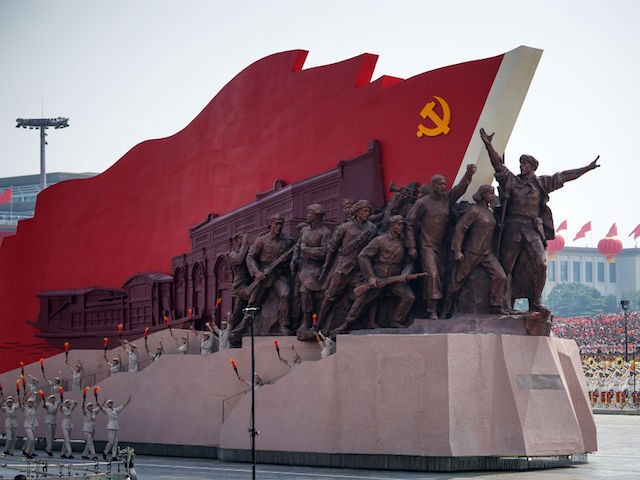
A float featuring the communist hammer and sickle is seen during a parade to celebrate the 70th Anniversary of the founding of the People’s Republic of China in 1949, at Tiananmen Square on October 1, 2019 in Beijing, China. (Andrea Verdelli/Getty Images)
If we learn from our history, we will know that even when the situation seems dire, there’s always hope. Still, today, we can’t kid ourselves about the challenge ahead: We’re in an epic contest with China, and while we must hope and pray that it stays cold, we must realize that it could get hot.
In the meantime, as we gather our strength, patriotic and freedom-loving Americans need to make sure that top athletes, big sports leagues, and giant corporations are on our side. As of now, there’s no reason to think that they are.
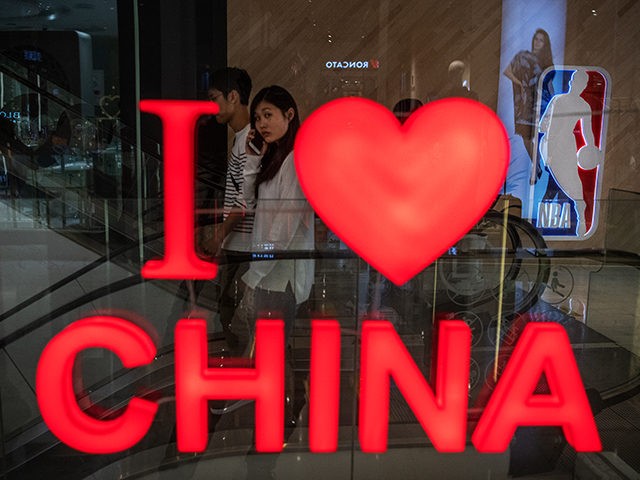

COMMENTS
Please let us know if you're having issues with commenting.